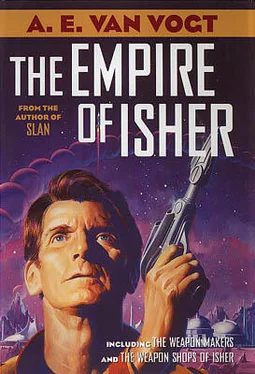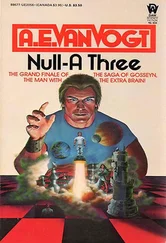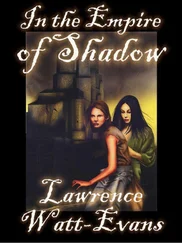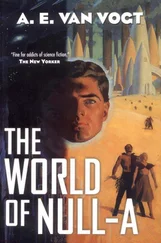“Go back, Jor, while I pull.”
The man retreated, but it did no good. And tugging did not help. The door would not open. Somewhere in the crowd, a man said darkly, “It decided to let you in, then it changed its mind.”
“What foolishness are you talking!” Fara spoke violently. “ It changed its mind. Are you crazy? A door has no sense.”
Fear put a quaver into his voice. Shame at his alarm made him bold beyond his normal caution. Fara faced the shop grimly. The building loomed there under the night sky, in itself bright as day, alien and menacing, and no longer easily conquerable. He wondered what the soldiers of the empress would do if they were invited to act. And, suddenly, he foresaw flashingly that even they would be able to do nothing. Fara was conscious of horror that such an idea could enter his mind. He shut his brain tight.
“The door opened for me once,” he said wildly. “It will open again.”
It did. Gently, without resistance, with that same sensation of weightlessness, the strange, sensitive door followed the tug of his fingers. Beyond the threshold was dimness, a wide, darkened alcove. Behind him, Mayor Dale said:
“Fara, don’t be a fool. What will you do inside?”
Fara was amazed to realize that he had stepped across the threshold. He turned, startled, and stared at the blur of faces. “Why—” he began blankly, then he brightened—“Why, I’ll buy a gun, of course.”
The brilliance of his reply, the cunning implicit in it, dazzled him for half a minute longer. The mood yielded slowly as he found himself in the dimly lighted interior of the weapon shop.
It was preternaturally quiet inside. No sound penetrated from the night out of which he had come. Fara walked forward gingerly on a carpeted floor that deadened his footsteps. His eyes accustomed themselves to the soft lighting, which came like a reflection from the walls and ceiling. He had expected ultranormalness. The ordinariness of the atomic lighting acted like a tonic to his tensed nerves. He glanced around with gathering confidence. The place looked normal enough. It was a shop, scantily furnished. There were showcases on the walls and on the floor, lovely things, but nothing unusual, and not many of them—a dozen. There was in addition a double door leading to a back room.
Fara tried to keep one eye on that door as he examined several showcases, each with three or four weapons either mounted or arranged in boxes or holsters. With narrowed eyes, he estimated his chances of grabbing one of the weapons from a case, and then, the moment someone came, force him outside where Jor would perform the arrest. Behind him, a man said quietly, “You wish to buy a gun?”
Fara turned with a jump. Brief rage flooded him at the way his plan had been wrecked by the arrival of the clerk. The anger died as he saw that the clerk was a fine looking, silverhaired man, older than himself. That was disconcerting. Fara had an immense and almost automatic respect for age. He said at last, lamely, “Yes, yes, a gun.”
“For what purpose?” said the man in his quiet voice. Fara could only look at him. He wanted to get mad. He wanted to tell these people what he thought of them.
But the age of this representative locked his tongue. He managed speech with an effort of will. “For hunting.” The plausible words stiffened his mind. “Yes, definitely for hunting. There is a lake to the north of here,” he went on more fulsomely, “and—”
He stopped, scowling at the extent of his dishonesty. He was not prepared to go so deeply into prevarication. He said curtly, “For hunting.”
Fara was himself again. He hated the man for having put him so completely at a disadvantage. With smoldering eyes he watched the old fellow click open a showcase and take out a green-shining rifle. As the man faced him, weapon in hand, Fara was thinking: “Pretty clever, having an old man as a front.” It was the same kind of cunning that had made them choose the property of Miser Harris. He reached for the gun; but the man held it out of his reach.
“Before I can even let you test this,” lie said, “I am compelled by the by-laws of the weapon shops to inform you under what circumstances you may purchase a gun.’
So they had private regulations. What a system of psychological tricks to impress the gullible.
“We weapon makers,” the clerk was saying mildly, “have evolved guns that can, in their particular range destroy any machine or object made of what is called matter. Thus whoever possesses one of our weapons is more than a match for any soldier of the empress. I say more because each gun is the center of a field of force which acts as a perfect screen against immaterial destructive forces. That screen offers no resistance to clubs or spears or bullets, or other material substances, but it would require a small atomic cannon to penetrate the superb barrier it creates around its owner.
“You will readily comprehend,” the man went on, “that such a potent weapon could not be allowed to fall, unmodified, into irresponsible hands. Accordingly, no gun purchased from us may be used for aggression or murder. In the case of the hunting rifle, only such specified game birds and animals as we may from time to time list in our display windows may be shot. Finally, no weapon can be resold without our approval. Is that clear?”
Fara nodded. For the moment, speech was impossible to him. He wondered if he ought to laugh out loud, or curse the man for daring to insult his intelligence. So the gun mustn’t be used for murder or robbery. So only certain birds and animals could be shot. And as for reselling it, suppose—suppose he bought this thing, took a trip of a thousand miles, and offered it to some wealthy stranger for two credits—who would ever know? Or suppose he held up a stranger. Or shot him. How would the weapon shop ever find out? He grew aware that the gun was being held out to him stock first. He took it, and had to fight the impulse to turn the muzzle directly on the old man.
“How does it work?” he asked.
“You simply aim it, and pull the trigger. Perhaps you would like to try it on a target we have.”
Fara swung the gun up. “Yes,” he said triumphantly, “and you’re it. Now, just get over there to the front door, and then outside.” He raised his voice. “And if anybody’s thinking of coming through the back door, I’ve got that covered, too.” He motioned jerkily at the clerk. “Quick now, move! I’ll shoot! I swear I will.”
The man was cool, unflustered. “I have no doubt you would. When we decided to attune the door so that you could enter despite your hostility, we assumed the capacity for homicide. However, this is our party. You had better adjust yourself accordingly, and look behind you.”
There was silence. Finger on trigger, Fara stood moveless. Dim thoughts came of all the half-things he had heard in his days about the weapon shops; that they had secret supporters in every district, that they had a private and ruthless hidden government, and that once you got into their clutches, the only way out was death. But what finally came clear was a mind picture of himself, Fara Clark, family man, faithful subject of the empress, standing here in this dimly-lighted store, deliberately fighting so vast and menacing an organization. He forced courage into his sagging muscles. He said, “You can’t fool me by pretending there’s someone behind me. Now, get to that door.”
The firm eyes of the old man were looking past him. The man said quietly, “Well, Rad, have you all the data?”
“Enough for a primary,” said a young man’s voice behind Fara. “Type A-7 conservative. Good average intelligence, but a Monaric development peculiar to small towns. One-sided outlook fostered by the Imperial schools present in exaggerated form. Extremely honest. Reason would be useless. Emotional approach would require extended treatment. I see no reason why we should bother. Let him live his life as it suits him.”
Читать дальше











